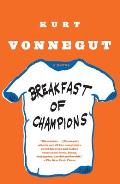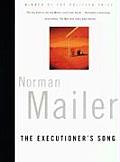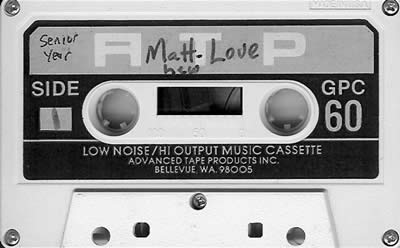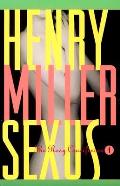How did we discover the books that changed our lives?
Through the years, as I became a high school teacher, then a writer, now both, I have pondered this question. I especially think hard on it when the summer fades and I begin preparations to return to the classroom.
My answer is a teacher named Doug Winn. He taught 22 years at Grant High School in Portland before retiring in 2008. He must have influenced hundreds of students in his career, but I may have been the first and it wasn't at Grant.
In 1980, my junior year at Oregon City High School, I landed in a creative writing course taught by Doug Winn. I suspect now it was his first teaching job, and he must have been in his mid 20s, reedy, with wavy hair and a bushy mustache.
It was a small class, maybe 15 students. He required us to keep journals and often made observations in the margins. He also dictated a commentary on cassette tape about our writing twice during the semester. Each one of my tapes runs to nearly 45 minutes. Some of Winn's commentaries were made in public places such as a Laundromat, where bizarre characters would occasionally interact with him as he spoke into the recorder. I still have them.
We met Winn's inaugural distribution of the tapes with utter astonishment: we didn't know they were coming. At lunch I raced out to my car, plugged the tape into the cassette player, and listened to what my teacher had to say about my writing. I also heard him recommend authors.
 Winn told me something about my writing's wry voice and candid sexual content reminded him of Kurt Vonnegut and that maybe I should check this author out. I did, the very day Winn advised this. I rushed to the school library and found the novel Breakfast of Champions. I picked it up, thumbed the pages, and noticed some peculiar drawings, including ones of the American flag and a female's pubic hair.
Winn told me something about my writing's wry voice and candid sexual content reminded him of Kurt Vonnegut and that maybe I should check this author out. I did, the very day Winn advised this. I rushed to the school library and found the novel Breakfast of Champions. I picked it up, thumbed the pages, and noticed some peculiar drawings, including ones of the American flag and a female's pubic hair.
In the book I came across sentences such as: "1492: The teachers told the children that this was when there continent was discovered by human beings. Actually, millions of human beings were already living full and imaginative lives on the continent in 1492. That was the simply the year in which sea pirates began to cheat and rob and kill them."
I devoured Breakfast of Champions and the rest of Vonnegut's novels. I had never read anything like them: the voice, satire, time-bending, moral outrage, revisionist history, tone, and the bursts of ribald sexuality. I knew I didn't want to write like Vonnegut, but his words and ideas constituted an intellectual and emotional counterpoise to all that I loathed as superficial in high school. I desperately needed the contrasts Vonnegut offered, and their presence in print represented a kind of affirmation for my disaffection and, I think, a direction.
Next Winn mentioned Norman Mailer. I'd never heard of him. I took the bus to Portland to visit for the first time, Powell's Bookstore, a place Winn insisted I explore. He practically ordered me to do it. On a Saturday, I rode the bus downtown, asked a homeless man where I could find Powell's, entered the store, and there an Oregon kid began a relationship with an Oregon bookstore that changed the Oregon kid's life to the point that later the Oregon kid now sells the books he wrote about Oregon at the Oregon bookstore.
 I browsed for hours and eventually bought The Executioner's Song, The Armies of the Night, and The Fight.
I browsed for hours and eventually bought The Executioner's Song, The Armies of the Night, and The Fight.
I opened with The Armies of the Night, Mailer's third-person account of his chaotic participation in a 1967 protest march against the Vietnam War. In this book, I read sentences such as: "He had in fact learned to live in the sarcophagus of his image — at night, in his sleep, he might dart out, and paint improvements on the sarcophagus."
Immediately, I began emulating Mailer's third-person point of view when writing about myself, which by then was nearly everything I wrote. As I read those bombastic pieces today, I imagine the power shuddering through me as 17-year old fledgling writer experimenting with voice and how the narrator might integrate himself in a piece of journalism, or New Journalism as I later found out it was called. You could plunge into a story, enact a small, but vital role inside it, serve as its reporter, and catalyze things. That's pretty much how I would describe the main editorial thrust of everything I've ever published about Oregon history.

Winn launched a literary magazine that year and I got the impression then he might have paid for the press run himself. He kicked off this venture in grand style by convincing the police to cooperate with the magazine's staff to stage a phony automobile accident in front of the school. Thus, we called the magazine Pile Up on 12th and Jackson and it contained five of my pieces, including a non-fiction story in the style of The Armies of the Night called "Love Among the Little Girls" that I now use with my students as an example of how not to write.

At times, my Maileresque prose must have bordered on insufferable for Winn to read, much less critique. It was to his credit and my everlasting benefit that he could say into the tape recorder, "You have a little of this attitude that 'nobody is smart but me' and that kind of attitude is not fun to be around. I don't get a good response that a reader gets into that kind of attitude." That might have been the most cogent piece of writing advice I have ever received.
In my senior year, I took an independent study in creative writing with Winn and part of this entailed reviewing a book a week. He suggested John Steinbeck, Gore Vidal, Edgar Lee Masters, Joan Didion, and E.L. Doctrow among other authors. As graduation loomed, Winn invited a few students over to his house for dinner and cooked us a spaghetti feast while incense burned and a jazz record played.
 That evening, he presented us homemade candles as special 'writers' gifts. A few days later, Winn found me at school and handed over my graduation present: used copies of Henry Miller's trilogy The Rosy Crucifixion: Sexus, Nexus, and Plexus. Without any sort of preface to Miller except to say, "I think you'll like this guy, now go out and become a writer." That summer I read the trilogy and on its very first page encountered the line, "To make absolute, unconditional surrender to the woman one loves is to break every bond save the desire not to lose her, which is the most terrible bond of all."
That evening, he presented us homemade candles as special 'writers' gifts. A few days later, Winn found me at school and handed over my graduation present: used copies of Henry Miller's trilogy The Rosy Crucifixion: Sexus, Nexus, and Plexus. Without any sort of preface to Miller except to say, "I think you'll like this guy, now go out and become a writer." That summer I read the trilogy and on its very first page encountered the line, "To make absolute, unconditional surrender to the woman one loves is to break every bond save the desire not to lose her, which is the most terrible bond of all."
I never forgot that line or my initial experience with Henry Miller. His candor felt like a drug and I'm still hooked on it. I never bought into all his pronouncements about human sexuality, but the intensity of his passion has never left me.
I also never forgot the charge Doug Winn put to me my senior year. It took time and maturity, but through his teaching, but more crucially, through the books he introduced, I believe I found the path to fulfill whatever literary promise he held for me.
School starts for me in a couple of weeks, teaching English, journalism and creative writing at Newport High School. I can only hope I turn some of my students on to books the way Doug Winn did for me.